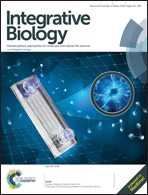Production of monoclonal antibodies in microfluidic devices†
Abstract
Herein, a microfluidic device with cistern design for cultivation of adherent eukaryotic cells for the production of recombinant proteins is presented. The geometric configuration of the microchannels in the device provided laminar flow with reduced velocity profiles in the cisterns, resulting in an adequate microenvironment for long-term adherent cell growth with passive pumping flow cycles of 24 hours. CHO-ahIFNα2b and HEK-ahIFNα2b adherent cell lines expressing a novel anti-hIFN-α2b recombinant monoclonal antibody (MAb) for the treatment of systemic lupus erythematosus were cultured on the surface of PDMS/glass microchannels coated with poly-D-lysine. A 24 day culture of CHO-ahIFNα2b cells resulted in MAb concentrations up to 166.4 μg mL−1 per day. The productivity of CHO-ahIFNα2b and HEK-ahIFNα2b cell lines was higher in the microdevice compared to that obtained using the adherent cell culture method (T-flask), with a 5.89- and 7.31-fold increase, respectively. Moreover, biological analysis of the MAbs produced in the microdevice showed no significant differences in the neutralizing antiproliferative activity of the hIFN-α2b or the cytokine cell signaling compared to the MAbs produced with cell adherent methods. These results suggest that this microfluidic device is suitable for long-term culture of mammalian cells and can improve the productivity of cells expressing recombinant MAbs with potential for therapeutic use without affecting the quality attributes of the product.



 Please wait while we load your content...
Please wait while we load your content...